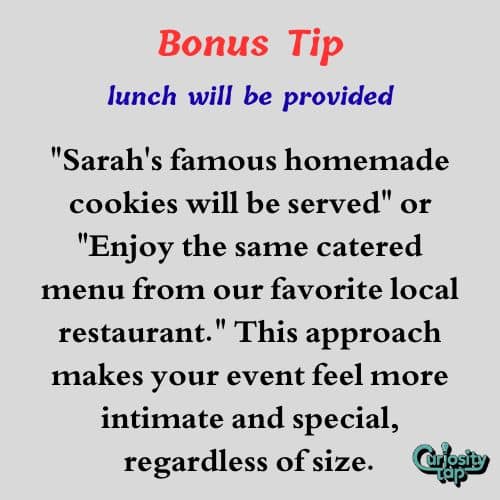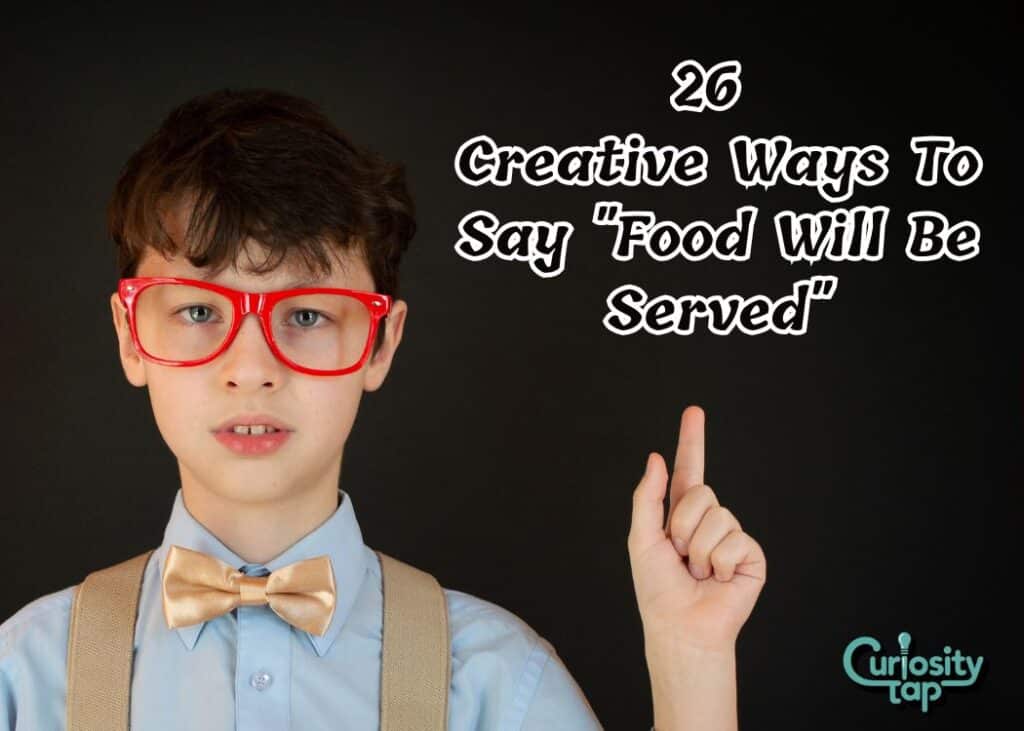Picture this: You’re crafting the perfect invitation for your upcoming event, and you reach that crucial moment where you need to mention the food. Your fingers hover over the keyboard as you type the same old phrase everyone uses: “Food will be served.”
But wait – doesn’t that sound a bit… bland? A little too predictable?
Whether you’re planning a casual get-together, a corporate event, or an elegant gala, the way you announce food service sets the tone for your entire gathering.
The right words can transform a simple meal announcement into an exciting promise that gets your guests genuinely excited about attending.
Your invitation wording is the first taste your guests get of what’s to come. Why settle for ordinary when you can create anticipation, spark curiosity, and perfectly match your event’s atmosphere with creative, engaging language?
What Does “Food Will Be Served” Really Mean?
Before diving into creative alternatives, let’s understand what this phrase actually communicates to your guests.
“Food will be served” is a straightforward announcement that tells attendees they don’t need to worry about bringing their own meals or eating beforehand. It’s a hospitality promise that food will be provided as part of the event experience.
This simple phrase serves several important purposes:
- Sets expectations about meal availability
- Indicates timing (food comes during the event)
- Shows hospitality and thoughtfulness as a host
- Helps with planning for both host and guests
However, while functional, this traditional phrase often lacks personality and fails to capture the excitement of sharing a meal together. That’s where creative alternatives come in – they maintain the same essential information while adding tone, atmosphere, and genuine enthusiasm.
Casual and Friendly Food Announcements
When you’re hosting informal gatherings, family-style events, or casual reunions, your food announcement should feel warm and welcoming. These phrases work perfectly for backyard barbecues, game nights, weekend brunches, and neighborhood gatherings.
Relaxed and Inviting Options
- “We’ve got the eats covered” – Perfect for casual parties where you want to sound laid-back
- “Come hungry – the table will be full” – Creates excitement and promises abundance
- “Treats and eats provided” – Great for children’s parties or family-friendly events
- “Good food and better company guaranteed” – Emphasizes both the meal and social experience
- “Kitchen’s cooking up something special” – Adds mystery and personal touch
- “Fuel up with us” – Ideal for casual get-togethers or sports-related events
Playful and Creative Expressions
- “Feast your eyes (and stomachs)” – Clever wordplay that works for visual or themed events
- “Good times and good food guaranteed” – Links food with fun atmosphere
- “Join us for tasty delights” – Simple but more engaging than standard phrases
- “Snacks and treats throughout” – Perfect for all-day events or extended gatherings
Professional and Semi-Formal Food Service Language
Corporate events, business meetings, and professional gatherings require more polished language while still being clear and inviting. These phrases maintain professionalism while showing attention to hospitality.
Business-Appropriate Announcements
- “Light refreshments available” – Ideal for afternoon workshops or training sessions
- “Catered lunch included” – Clear and direct for business conferences
- “Dining service provided” – Professional tone for corporate events
- “Appetizers and beverages served” – Perfect for networking events or cocktail parties
- “Complimentary meal service” – Emphasizes value and cost transparency
Semi-Formal Event Options
- “Refreshment station open throughout” – Great for large gatherings with continuous service
- “Menu service provided” – Suggests organized, seated meal experience
- “Culinary offerings available” – Slightly more elegant than basic announcements
- “Dining arrangements included” – Comprehensive phrase covering food and seating
Formal and Elegant Event Phrases
Black-tie events, weddings, award ceremonies, and upscale gatherings deserve language that matches their sophisticated atmosphere. These phrases convey elegance and refined hospitality.
Upscale Event Announcements
- “Full-course dinner will be presented” – Indicates formal dining experience
- “Banquet to follow ceremony” – Classic phrase for formal events
- “Culinary offerings will be served” – Sophisticated language for high-end events
- “Formal dinner service included” – Clear about service style and formality
- “Gourmet reception to follow” – Promises high-quality food experience
Luxury and Premium Options
- “Curated dining experience awaits” – Suggests thoughtful menu selection
- “Artisan meal service provided” – Implies gourmet preparation
- “Premium culinary presentation” – Emphasizes quality and presentation
- “Executive dining arrangements” – Perfect for high-end corporate events
Creative and Themed Announcements
Sometimes your event calls for something completely unique. These creative options work well for themed events, art gallery openings, charity galas, or any gathering where you want to make a memorable impression.
Unique and Memorable Phrases
- “Nourishment for body and soul” – Perfect for wellness or spiritual events
- “Culinary adventures await” – Great for international cuisine or food festivals
- “Flavors from around the world” – Ideal for multicultural events
- “A feast for all the senses” – Works for gourmet experiences or sensory events
Specific Meal and Service Style Indicators
Sometimes clarity is key. These phrases not only announce food availability but also specify timing, service style, or meal type.
Clear Service Style Communication
- “Breakfast/Lunch/Dinner included” – Specific about meal timing
- “Buffet service available” – Indicates self-service style
- “Hors d’oeuvres will be circulated” – Describes service method
- “Continuous refreshment service” – Perfect for extended events
Choosing the Right Phrase for Your Event
Selecting the perfect food announcement depends on several key factors that successful event planners always consider.
Consider Your Event Context
Event formality level should guide your language choice. A casual backyard barbecue calls for relaxed, fun language, while a corporate board meeting requires more professional tone.
Time of day matters too. Morning events might mention “breakfast provisions,” while evening gatherings could reference “dinner service” or “late-night snacks.”
Match Your Audience Expectations
Think about who’s attending your event. Family-friendly gatherings benefit from warm, inclusive language, while professional networking events need clear, business-appropriate phrases.
Cultural considerations also play a role. Some communities prefer direct, specific language, while others appreciate more creative or traditional approaches.
Practical Communication Tips
Always be transparent about what you’re actually providing. Don’t promise a “feast” if you’re serving light snacks, and avoid vague language that might confuse guests about meal availability.
Consider dietary restrictions in your wording. Adding phrases like “accommodations available” or “vegetarian options included” shows thoughtfulness and inclusivity.
What to Avoid When Announcing Food Service
Expert advice: Stay away from overly complex language that might confuse guests. Phrases like “gastronomic provisions shall be rendered” sound pretentious and unclear.
Don’t make promises you can’t keep. If you’re providing simple appetizers, don’t announce a “gourmet feast.” Authenticity in your food announcements prevents disappointment and builds trust.
Avoid cultural or dietary assumptions. Phrases like “meat lovers’ paradise” exclude vegetarian guests, while “exotic cuisine” might seem insensitive to some cultures.

Bonus Tip: The Power of Personal Touch
Here’s an insider secret from experienced event planners: Adding a personal element to your food announcement creates instant connection with guests.
Instead of generic phrases, try: “Sarah’s famous homemade cookies will be served” or “Enjoy the same catered menu from our favorite local restaurant.” This approach makes your event feel more intimate and special, regardless of size.
Personal touches also work for corporate events. “The executive chef will prepare seasonal selections” sounds much more engaging than “lunch will be provided.”
Making Your Food Announcement Count
The way you announce food service sets expectations and creates excitement for your event. Whether you choose casual, professional, or creative language, make sure it matches your event’s atmosphere and audience expectations.
Remember that food announcements are really hospitality statements. They tell your guests you’ve thought about their comfort and needs. Choose words that reflect your genuine enthusiasm for sharing good food and good times.
Your invitation wording is the first course in your event experience. Make it count by selecting phrases that truly represent the warmth, style, and quality your guests can expect when they arrive.
Frequently Asked Questions
What does “food will be served” mean in an invitation?
“Food will be served” means the host will provide meals or refreshments during the event, so guests don’t need to bring their own food or eat beforehand. This phrase sets clear expectations about meal availability and shows hospitality planning.
How do I choose the right food announcement for my event?
Consider your event’s formality level, audience expectations, and atmosphere. Casual gatherings work well with friendly phrases like “come hungry,” while professional events need more polished language like “light refreshments available.” Match your tone to your event style.
Should I be specific about the type of food being served?
Yes, specific meal indicators help guests plan better. Phrases like “buffet service available” or “hors d’oeuvres will be circulated” clearly communicate service style and meal type. This transparency prevents confusion and sets accurate expectations.
What food announcement mistakes should I avoid?
Avoid overly complex language that confuses guests, making promises you can’t keep (like announcing a “feast” for simple snacks), and using culturally insensitive phrases. Keep your announcements clear, authentic, and inclusive of different dietary needs and preferences.
Conclusion
The words you choose to announce food at your event do more than just inform they create anticipation, set the tone, and show your guests how much you care about their experience.
Whether you opt for the casual warmth of “come hungry, the table will be full” or the elegant sophistication of “gourmet reception to follow,” your food announcement becomes part of your event’s story.
Remember, great hospitality starts with great communication, and the perfect phrase can transform a simple meal into a memorable moment that guests will talk about long after the last bite.
So ditch the boring “food will be served” and choose words that truly capture the excitement and warmth you want to share with everyone who walks through your door.
Read more knowledgeable blogs on Curiosity Tap
Is this article helpful?

Jackson Pearson is a passionate educator and language enthusiast behind the blog Jackson Pearson. With years of experience in teaching and writing, he specializes in simplifying complex grammar rules, breaking down tricky vocabulary, and crafting learning guides that are both engaging and practical. His mission is to help readers boost their English skills whether they’re beginners or brushing up for fluency. Through every article, Jackson brings clarity, structure, and a spark of curiosity to the world of English learning.



